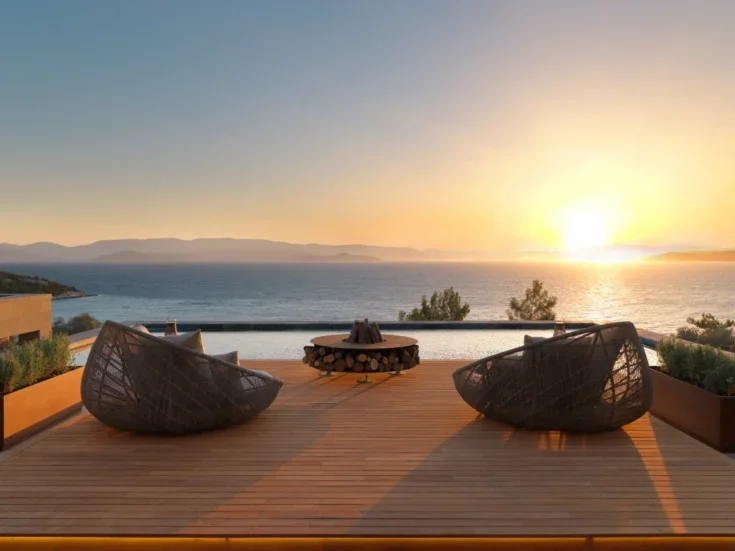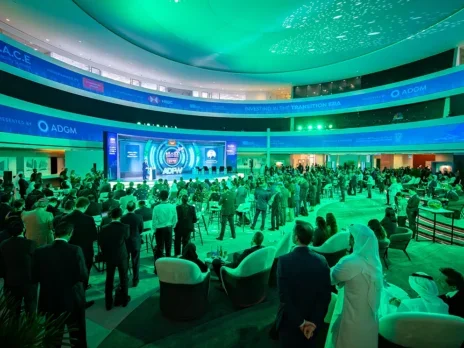
McLaren supremo Ron Dennis talks to William Cash about money, motivation, marriage and 25 years at the top of the F1 game
T
he day before I formally met Ron Dennis at McLaren’s futuristic, secretive, energy-bursting, silver-racing-trophy-stuffed factory near Woking, he gave a speech at the opening of a new exhibition at the National Science Museum in South Kensington. In it he said that the world of F1 ‘is no place for the faint-hearted. It’s tough — ruthless in fact — and, to paraphrase the great Charles Darwin, it’s all about survival of the fittest.’
Survival is something that Dennis knows all about. Standing in a trademark immaculate dark suit, white shirt and red silk tie in a gallery in which the chassis of a McLaren-Mercedes MP4-21 was suspended from the ceiling, Dennis went on to reveal the chilling statistic — chilling if you have ever thought of actually investing in, or creating, an F1 racing team from scratch — that since he started out in F1 some 43 years ago, back in 1966 when Enzo Ferrari was still ‘il capo’ (the boss) at Ferrari, some 79 teams ‘who were simply not competitive enough to survive’ have crashed out of the sport.
‘Successful teams in this high-stakes sport innovate at an incredible rate,’ Dennis went on. ‘We make a change to our cars on average every 20 minutes throughout the entire season. And we do that every season. We innovate at such a rate, in fact, that technologies whose applications are far broader than racing are created as a matter of course. Such technologies often have their genesis in racing cars but then find suitability to products or situations never foreseen by their creators.’

Dennis does not believe in mulling on the past, and when I met him he was already fixed on the next chapter in his life as an entrepreneur. Over the last 25 years, Dennis has risen to the very top of the world of F1 through grit, determination and tenacity. His latest challenge is now to accelerate ahead with launching a new range of ‘pure’ McLaren-made road-going super-cars. But can he repeat the success he has had on the racetrack with road cars?
I
t was Dennis’s energy and passion for technical detail and innovative excellence that resulted in his transforming McLaren Racing — which he merged with the old Marlboro racing team in a daring and gutsy reverse takeover in 1981 — into one of the world’s most successful ever F1 operations.
Since then, under Dennis, McLaren has won 138 grands prix, seven constructors’ world championships and ten drivers’ world championships — those drivers’ titles won by such legends as Niki Lauda, Alain Prost, Ayrton Senna, Mika Hakkinen and, last year, Lewis Hamilton.
In truth, Dennis is not exactly starting from scratch in his new endeavour. For the past two years McLaren has been developing a new range of ‘pure’ McLaren super-cars which are intended to capitalise on the brand successes of the legendary 1993 McLaren F1 and the still-in-production Mercedes-Benz SLR McLaren, which is also made at the McLaren factory and retails at around £340,000. On my factory tour I saw some of the last of this series being built — judging by the spec they looked as though they were being shipped off to a group of speed-obsessed sheikhs somewhere like Dubai.
On the day that it was announced that Dennis was taking on this new role, focusing most of his energies on McLaren Automotive, it was also announced that Credit Suisse had been appointed to ‘facilitate’ the raising of additional capital of £250 million to fund the new venture. ‘With proposals in place for a new McLaren super-car production facility in the UK, and the potential for up to 800 skilled jobs, McLaren Automotive’s expansion will represent a significant investment in the UK automotive industry,’ said Dennis.
T
he new investment prospectus relating to this £250 million requirement will be read closely by wealthy private investors, sovereign wealth funds, private equity funds and the like — who will be intrigued to find out whether Dennis can pull off this ambitious scheme to take on the big boys of the super-car world from Woking.
If any Spear’s readers find the investment prospectus landing on their desks, they might want to know what sort of man would even think of starting a new car company in the current economic climate. I was invited to meet Dennis at his hi-tech factory to find out.

Currently, McLaren’s largest shareholders include Mercedes-Benz, who supply the F1 team’s engines and own 40 per cent; Bahrain Mumtalakat, Bahrain’s Sovereign Wealth Fund, who own 30 per cent; and Dennis himself, who, after selling half his shareholding in the group to the Bahraini fund in January 2007, now owns 15 per cent of the business. The other 15 per cent is held by Mansour Ojjeh, the head of TAG Group, which has been a long-term partner of Dennis.
So what is the mercurial and fastidious Ron Dennis really like? Is his latest venture something that an ultra-high-net-worth investor with a couple of tens of millions spare should be tempted to back? And is it really true that, as he once admitted, he likes to wash his hands a lot?
Arriving at the McLaren factory is like arriving at Nasa or some sort of top-secret military installation. After being handed a glossy ‘Visitors’ Guide’ to the centre, I followed directions to the ‘rotunda’. ‘Proceed along the corridor for about 100m, passing the staircase on your right until you arrive at the lift. Please note that you cannot see the lift as it is behind a curved white wall.’ Even before I met Ron Dennis, I was getting a taster of McLaren-speak — or ‘Ronspeak’, as racing journalists have long fondly referred to Dennis’s autodidactic approach to communication.
After getting lost in the vast, sprawling car park, I finally find my way to the entrance leading to Dennis’s private office. I was only able to find it after I realised that there was only one person who was allowed to park their Mercedes-Benz AMG SL right outside the facility, as opposed to in the car park. And that is Dennis himself.
W
alking out of the lift to the first floor, I almost bump into Dennis as he walks towards his office along the glass-backed corridor overlooking his factory’s private lake. What I hadn’t expected was the sheer polish and rock-like charisma of the man. I had actually encountered the McLaren boss by chance a few nights before in a London restaurant, and we had exchanged a few words; but in the silence of his factory, on his own turf, Dennis had a more commanding and steely presence.

Nothing was out of place. His dark suit was immaculate; his shoes looked brand new; his shirt, crisply starched and standing to attention; his eyes clear and focused; his handshake firm and solid. In a word, he had a metallic presence — on first impression, yes, definitely a man with whom you would want to invest. Within a few minutes of sitting down in a corner table in his hushed, sleek and minimalist office, guarded by two female executive assistants, I was remembering the line from Nietzsche that Dennis had chosen to end his speech at the Science Museum the day before: ‘That which doesn’t kill us makes us stronger.’
One thing is certain. Dennis isn’t the type to get nostalgic about his grand prix racing days. He only thinks ahead.
‘I don’t spend much time on the past of anything,’ he says. ‘I’m pretty forward-looking. You want to be the best — original thought and pushing forward design are what I’m about and what McLaren is about.’ Already, Dennis has more than 20 prototype of cars in development. The first of McLaren Automotive’s new models has been secretly codenamed P11 and is being positioned to compete directly with the Ferrari F430.
Dennis is a fighter and a survivor and a man who does what he does with exactitude, drive and commitment. ‘I admit I’m not always easy to get on with,’ he said on the day he stepped down from his role as chairman. ‘I admit I’ve always fought hard for McLaren in F1. I doubt if Max Mosley or Bernie Ecclestone will be displeased by my decision. But no one asked me to do it; it was my decision. Equally, I was the architect of today’s restructure of the McLaren Group. Again, no one asked me to do it. It was my decision.’
I
t is this gritty single-mindedness that places Dennis in the great podium of British engineering entrepreneurs. His carefully chosen words at the Science Museum with regards to the uses — outside of F1 — of racetrack technology have turned out to be highly prescient with regard to his own steep challenge ahead in effectively launching a new super-car production company at a time when UK car sales are down by 30 per cent and US car-maker Chrysler has just announced it is shedding 13,000 jobs.
I first asked Dennis about his ambition today. He was now seriously rich (the Sunday Times Rich List 2009 said he was worth around £87 million, down £23 million on 2008, but many F1 insiders insist he is worth much more than that) and had won as much racing silverware as anyone else in the business.

Did he really still have the same drive to succeed and prove himself to the world that he did when he was a young man with a point to prove? ‘I’ve known the angry young man, the assertive young man, and the quiet but extremely confident young man,’ he says. ‘I was always fiercely ambitious and I still am. It’s the easy way to understand the desire to succeed.’
Dennis’s ambition and desire to prove himself, he added, partly came from the fact that, when he first told friends about his ambition to go into motor racing, they laughed at him. ‘I got that from school friends and siblings. When I expressed a desire to go into motor racing in my teens, I wouldn’t say people fell on their backs, kicked their feet in the air and laughed, but it wasn’t far short of that. It was such a difficult thing to achieve because F1 was so close-knit and so difficult to get into.’
But he did manage to force his way in to the sport. He began his career as a mechanic with the Cooper F1 team. In 1968, he moved to work with Sir Jack Brabham. After Brabham retired, Dennis and his team-mate Neil Trundle launched their own Formula Two team, based in a workshop in Dennis’s home town of Woking.
By the late Seventies, Dennis was running his own team called Project Four; successes in F2 and F3 led to sponsorship backing from Philip Morris (Marlboro), which ended up with Dennis’s gambling everything on taking over the team and re-branding it McLaren International. Aged 34, Dennis was now back in F1 and running his own F1 equipe.
W
here does his super-competitive streak come from, I asked? ‘I was always competitive. My father was a very competitive individual. He was always playing some kind of sport throughout his whole life. Being competitive is perhaps in my genes but I also like the concept of a complex piece of sporting equipment. The more complex the piece of sporting equipment is, the more it is attractive to me because you can actually play a part in having that equipment optimised.’
You like technology that is superior and complicated? ‘Yes… I’m excited by any kind of mechanism. I love beautiful design. Normally, when it looks right, it is right. It’s not just F1 cars, it’s all design. Beauty is in the eye of the beholder.’

It comes as no surprise to learn that Dennis is quite a serious art collector. He goes to most art fairs around the world — he would often slip away to visit a gallery or fair when travelling on his Challenger 604 jet, which has the registration G-Reys and which he once described as ‘an extension of my home’ — but would not be drawn on which contemporary artists he likes to collect.
‘I buy art for its beauty, to wonder at, to enjoy,’ he says. ‘The idea of buying art as an investment, and then hiding it away in storage, is ridiculous to me. I’d never do that. I like art fairs so I go to them quite a lot. I wouldn’t say I’m obsessed with contemporary art but I enjoy contemporary art and I know exactly what I like, I know which artists and sculptors I like. To be precise, I like radical contemporary — and I like it because it visually, and in turn mentally, stimulates me.’
How important is money to him? Having sold a considerable chunk of his company in 2007, what was he planning on doing with his fortune, estimated by some F1 insiders to be well in excess of £100 million? ‘To me, money is completely unimportant, unless I haven’t got any,’ he replies. ‘So I’ve never been driven by money. I’ve always been driven by achieving a specific goal that I felt was achievable.’
I ask what he does with his money — does he gamble on the stock markets, invest in hedge funds, or is he a cautious investor? ‘Running a company whose chief activity has traditionally centred on motor racing is intrinsically risky,’ he says, smiling. ‘For that reason, I don’t feel the need to introduce extra risk to my own financial arrangements, so I’ve never been interested in chasing speculative high-yield investments.’
S
o you take a very conservative approach to your own personal financial affairs? ‘Very conservative is an understatement,’ Dennis admits, chuckling. ‘I’m totally risk-averse in that sense. I know too many people who have over-leveraged their investment portfolios in times of economic stability, only to find themselves in a lot of trouble when the stock markets crashed and the banks called time on their over-leveraging.’ It is a philosophy that has enabled him to sleep at night, one suspects.
In his own life, Dennis’s scariest financial moment was when he bought McLaren in 1981. ‘It was like going and borrowing £100 million. As an individual it was a real risk and it was a calculated risk. But I had a sort of hedge in place so everything worked out fine in the end.’
You could have lost everything? ‘Absolutely — and at one point in my career, some time before that, I did experience the trauma of losing everything, yes,’ he admits.

That painful experience of being nearly wiped out came when he was in his early twenties and ‘completely undervalued’ an asset that he sold. ‘I was never faced with liquidation or insolvency; I’ve never, ever, been in that situation. But it was hard. On the other hand, when you’re a young entrepreneur, those are the sorts of things that come along and kick you in the head. And you learn from them.’
Although Dennis is perceived as the ultimate ‘Woking mechanic made good’, and some people tend to assume that the bulk of his fortune was made in 2007 when he sold 15 per cent of McLaren to Bahraini Mumtalakat, he is actually a serial entrepreneur who has consistently made money from business ventures that have not always been centred on racing. He had equity, for example, in the Tag Heuer watch brand, which he helped grow as a business over the course of ten years.
‘The difference between the beginning value and the end value was just staggering,’ Dennis says. ‘It was a tremendous exit for everyone, so I look back on that with fondness. But I also look back, with an equal amount of pain, to when I lost quite a bit of money on an audiovisual company which made a very technically driven consumer product but which didn’t work out as a business.’ Although the company kept on winning hi-fi awards, it never made any money. ‘We lost money because effectively the technology that we developed was unaffordable,’ Dennis admits.
O
n the subject of money, Dennis believes that it is imperative that racing companies such as McLaren offer their advertisers and sponsors the best possible value packages. No one is suggesting that sponsoring an F1 team is cheap, but Dennis believes passionately that backing McLaren offers a unique opportunity for media exposure that reaches a global audience in a unique way. There are no fixed-rack rates, he adds; each corporate partnership programme is customised on a bespoke basis according to corporate requirements.
‘An F1 car is a high-speed billboard,’ says Dennis. ‘The audience figures are in the hundreds of millions and of course we’re running every two weeks in season. We’re only second to the Olympic Games and the World Cup, and they’re every four years.’
McLaren’s existing corporate partners include Vodafone, Johnnie Walker, Hugo Boss, Santander, SAP, Fed-Ex and Exxon Mobil. They are always looking for new ‘partners’, says Dennis, stressing that he does not like to use the word ‘sponsor’. ‘The word “sponsorship” is over-used in motorsport,’ he says.
‘What we offer is as convincing as any advertising agency. We’re fighting for the same budgets. F1 has the ability to communicate in a different way from traditional advertising, and that’s why companies invest in us. The important thing to remember is that we are an advertising medium and therefore our rate card is not determined by our engineering costs, it’s determined by the value of the brand exposure.’
Using the example of Johnnie Walker, Dennis explains how being involved with F1 has measurably helped their target audience — specifically the middle-aged — understand how responsible drinking is the most important thing to recognise in Diageo brands. ‘When we started this programme with them, we realised that the effectiveness of the programme had to be measurable.’
The first trial was in Sao Paulo (home of the Brazilian Grand Prix), where McLaren worked with the government and the police force and introduced a Responsible Drinking initiative whereby a designated driver could eat and drink non-alcoholic beverages at the expense of Diageo. The programme resulted in a large reduction in alcohol-related road deaths and injuries.
‘It was an initiative that we’ve rolled out across the world. It’s something that I’m personally very proud of, as I participated and promoted it personally, as does Lewis [Hamilton] and our other drivers. We also promote it in the UK. At Christmas you can pick up a voucher from participating bars and clubs that enables revellers to go home on buses, trains and taxis, free of charge. That initiative demonstrated how F1, as a car-based sport, has a unique role to play in respect of tackling the problem of drink-driving.’ W
hen I return to the subject of McLaren’s new road-going super-car division, Dennis’s enthusiasm becomes obvious. Obviously, McLaren Automotive will be focusing on ‘intelligent performance’, as Dennis describes it — but, in addition to that, he is eager to stress the great importance of ‘timeless design’. It is with that commodity in mind that the company has hired Frank Stephenson, the man who designed the new Mini for BMW, as its architect-in-chief.
‘In my mind the most important aspect of Frank’s CV is not so much that he was the first design director that Ferrari have ever had, or the fact that he designed the new Mini, but that everything he’s ever done demonstrates without doubt that his attention to detail is simply phenomenal. He reminds me of Giorgio Armani. A lot of tailors can take a length of cloth and turn it into a very attractive dress. But only a man of Armani’s genius can create from the same length of cloth a wonder of haute couture. And the devil — no, the difference — is in the detail.’
When I ask when Spear’s readers will be able to start placing orders for new road-going McLaren super-cars, Dennis is unwilling to provide a precise date, stressing that McLaren will not be merely launching a new car but rather ‘building an automotive brand’. Is it inevitable, I ask, that that all the specialist technology learned from producing race-winning F1 cars for the past twenty years will end up being redeveloped into a consumer car product?
Dennis refers me back to the statistic he revealed to the Science Museum audience the day before: that there have been 79 casualties among F1 constructors in the last 43 years. ‘In recent years it’s become ever clearer to me that, if an F1 team limits its activities only to F1, it fails. We’ve seen it too often. The F1 team as a solus operation is an outmoded business model — and that’s because F1 is too unstable. A company whose business is reliant on its F1 operation is like an inverted pyramid, teetering on its upturned apex. No, you need a broader base. And to broaden the base, you need to broaden the brand.’
He’s confident that, despite the global recession, the company is choosing the right course. ‘There’s been phenomenal growth in the global road-going super-car market in recent years, and around 135,000 units were sold in 2007. That figure will drop this year — but by the time we launch our first car in 2011, we expect the market to have recovered to around 120,000 units. We’re only targeting a market share of 3 per cent, which is a very conservative projection, but even with such a comparatively low market penetration the project is commercially robust.’ H
ow will he create such a car? ‘It will be a new sports car brand. We believe that a sports car has to be usable; it has allow you to go from A to B comfortably, get out the other end, park the car, have luggage space, and you won’t hesitate to think about driving it anywhere and parking it anywhere, and it being usable and affordable.’
Whether the rich will still have £150,000-plus to spend on a sports car by 2011 remains to be seen. What is certain, however, is that when you do create and build a F1 team that survives at the top for over 25 years, the price of success can be high. When I bumped into Dennis in London he was not with his wife. Last year, Dennis and Lisa, his wife of 22 years (and an author of children’s books), announced that they would be separating. They have three children. Their eldest, a daughter, is in her fourth year at Oxford University, studying medicine. Their son, 18, is completing his A-levels and will study aerospace engineering at Southampton University. Their younger daughter is 16.
Might son follow father into the family business? ‘It’s quite a broad engineering course at Southampton, so it should equip students to be entrepreneurial as well as engineering-focused. So it may well give him the relevant primary values,’ Dennis replies.
And what are those primary values, I wonder? I venture that, when he was running the McLaren F1 team and was interviewed about some incident, good or bad, he had a way of coming across as a bit of a street fighter who had trained himself to roll with the punches.
Was he really like that? A chuckle. ‘I like to feel that I was, and am, a little more sophisticated than a street fighter. In fact I analyse things very meticulously. I always have done, in fact — often in consultation with friends whose counsel I value. In 2007, when I was going through a challenging period of my professional life, I sought the advice of three individuals who were particularly supportive. I’d rather not say who they were,’ he replies, still smiling. D
o you think that the pressures of running a successful F1 team for so many years — and jetting around the world — exacted a toll on your marriage, I press him?
There is the longest pause. ‘I still have a great wife, but we just don’t happen to live together. In any relationship, events occur. They may not always occur the way you want them to — but, unfortunately, that’s life.’
Such a line may not quite have the ring of Nietzsche, but it is pure Ron.







